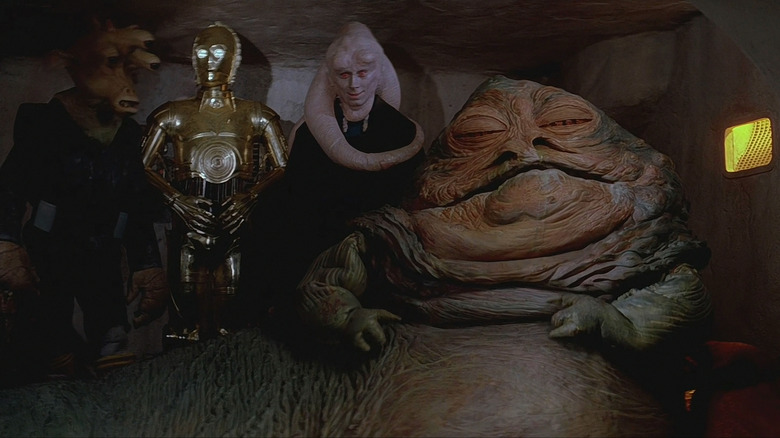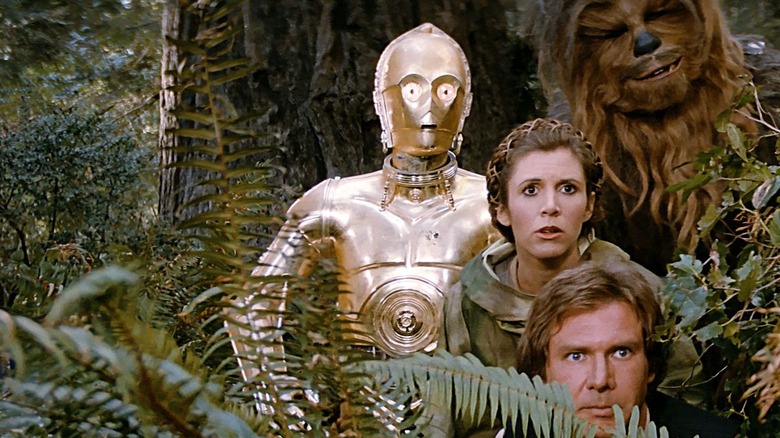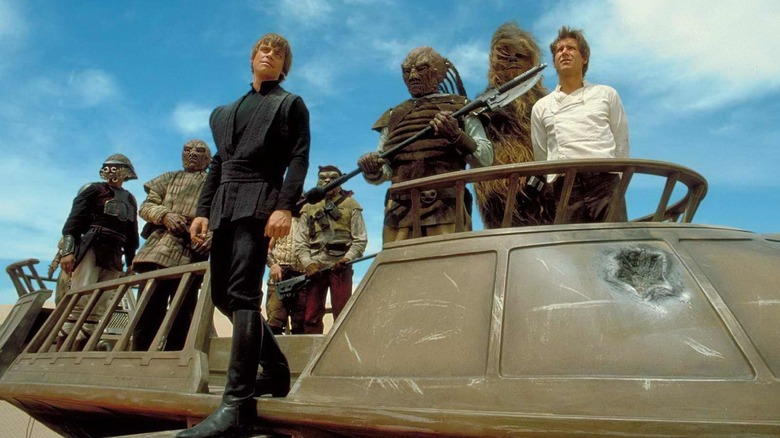George Lucas Had Two Key Requirements For Choosing Return Of The Jedi's Director
It's astonishing to consider how quickly "Star Wars" rose to prominence in the pop culture consciousness. George Lucas, the director of the 1977 original, merely wanted to make a high-octane version of classical space opera stories like the ones seen in "Flash Gordon" serials of the 1940s. One could not have predicted the overwhelming response from young audiences, or their thirst for toys and tie-in products, a relative novelty at the time. Fast-forward to 1983, and there had already been one beloved sequel, a TV special, and more toys than the Earth's landfills knew what to do with. When the time came to make "Return of the Jedi," Lucas had become a mere executive producer and story writer, hoping to farm out the directing gig to ... well, to anyone who fit two certain criteria.
Many might know that several soon-to-be-prominent directors were approached to direct "Return of the Jedi." David Cronenberg had already made films like "The Brood" and "Scanners" by the time he could have directed "Jedi," but he refused. In 1983, Cronenberg made "Videodrome" and "The Dead Zone" instead. One might say it was the wiser choice. David Lynch has also famously told stories about how Lucas attempted to court him. Lynch had no interest and, in 1983, made "Dune" instead. One might say it wasn't the wiser choice.
It seems that Lynch and Cronenberg were only two on a long roster of potential directors. Ultimately, Lucas selected British director Rochard Marquand for the project, but, by howdy, was he vetted. In John Philip Peecher's 1983 book "The Making of Return of the Jedi," Lucas explained his vetting process, and laid out the two tenets that all directors needed to fill: they needed to be able to handle large-scale productions, and, briefly, they needed to take "Star Wars" seriously.
Forming the list
When asked about his process, Lucas laid out, perhaps dryly, how he selected Marquand. It seemed that he was winnowed down from a "wish list" that Lucas had penned. He didn't seem to have a strong preference for one director in particular, knowing he would have to talk to all his "finalists" eventually. Step one, see who's free right now. As Lucas said:
"First of all, you get a list of the directors who are available. Sometimes you know their work, sometimes you don't. You eliminate the ones who aren't available. Then you go and ask the rest if they would like to do the movie, and half of those drop out because they don't want to do a 'Star Wars' movie. Who knows what personal reasons they have? You get a whole mass dropping out. So you are left with a group of, say, 20 to 30."
After the mass dropout of seeing who was available and who actually wanted to make a Star War, the first round of interviews was scheduled. Once producer Howard Kazanjian talked to them, Lucas got the next round. It wasn't until there were only a few left that Lucas bothered to take in their previous filmography. He said:
"The producer — Howard in this case — interviews them. He sees more of their films, talks to people who have worked with them before. I read the reports and say okay, these seem to be appropriate, these don't. You take 30 and knock it down to 15. I do a quick interview with them and then knock it back to five or three. I see everything they've ever done in terms of work, and then I have long interviews."
This sounds like any job interview process one goes through today.
The long interview
The long interview is where some of the more creative ideas started to come out. It was during this time that Lucas probed the potential director for the two requirements to make a "Star Wars" movie. If the director seemed confident and capable of wrangling such a massive project, they'd tick off one box. As Lucas said:
"I spend the day with them. Come over to my house, talk, go back and forth, and finally it's — you know — instinct. I'm looking for a lot of things. Somebody who has a lot of technical expertise. Who gets the job done, has had enough experience to handle something this big. It's not an easy kind of movie to make, so that's a prerequisite. You'd be surprised how many directors aren't professional enough to handle something this complicated."
Lucas also wanted to make sure that potential directors were going to take the project seriously. While "Star Wars" appeals to young children, Lucas wanted to make sure the directors weren't making films explicitly for children. Not only did Lucas feel that a director should be interested in directing, but they should also be versed in "Star Wars." He said:
"The next thing you look for in a 'Star Wars' director is somebody who doesn't just think it's kid's junk. Who understands what's going on. A lot of people don't understand, they think it's just some quick and easy kind of thing you throw out, not much behind it. But the truth of it is, there's a lot going on behind it, and the director has to have that sensibility."
Prior to "Return of the Jedi," Marquand had made a horror film called "The Legacy," a Beatles biopic, and the spy film "Eye of the Needle."
More importantly, though, he had gumption. That, apparently, was the third and final quality a director needed to take on "Star Wars."


